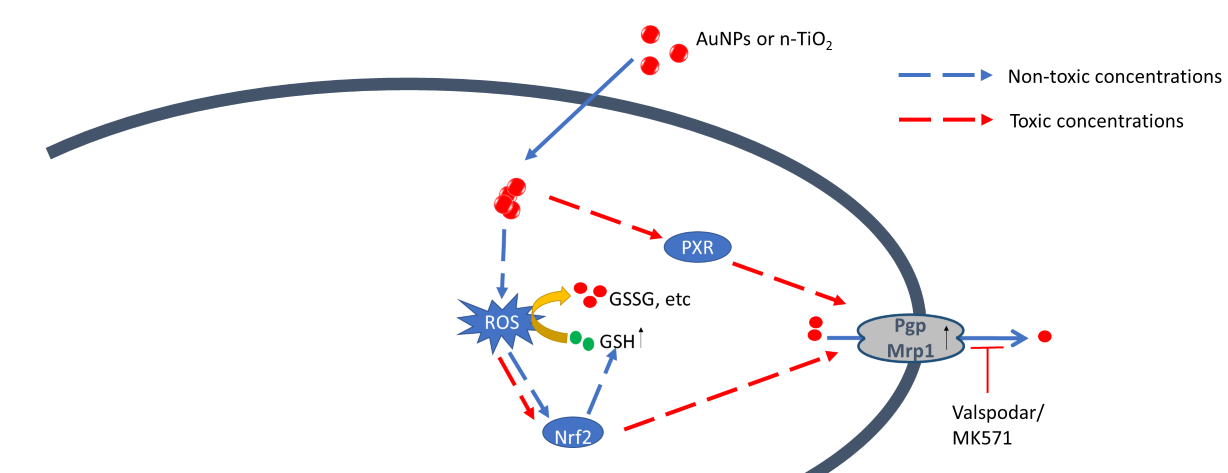As industrial development results in environmental deterioration, cancer is increasingly becoming a serious threat to human health. As one of the most common treatments for tumors, chemotherapy’s efficacy is often affected by multidrug resistance (MDR). MDR will not only lead to the failure of chemotherapy, but also make tumors resistant to a variety of drugs with different structures and different targets, contributing to tumor recurrence and metastasis, and accounting for 90% of chemotherapy-related deaths.
Since their first discovery in 1970, ATP-binding cassette (ABC) transporters such as MDR proteins and MDR-associated proteins have been considered as the main cause of MDR in tumor cells. Scientists have done lots of research to screen effective inhibitors to overcome MDR, but with little success, which could be attributed to the fact that the internal regulatory mechanism of MDR proteins is still largely unknown.
Besides, nanoparticles are increasingly being used as drug carriers to overcome MDR due to their larger particle size and enhanced permeability and retention (EPR) effect (nanoparticles and some macromolecular drugs are more likely to penetrate into tumor tissues and retain for a long time). However, further research indicated that the nanoparticles themselves may act as transporter inhibitors or inducers, which may help or hinder tumor treatment. It follows that the interaction between ABC transporters and nanoparticles is more complicated than expected, and further research is needed.
Recently, Professor YIN Jian and Professor YIN Huancai, from Suzhou Institute of Biomedical and Engineering of Chinese Academy of Sciences, used human lung cancer (A549) and human cervical cancer (HeLa) cells as models to study the potential interaction between ABC transporters and nanoparticles (gold nanoparticles and titanium dioxide (TiO2) nanoparticles). The results showed that ABC transporters didn’t mediate efflux and direct detoxification of these nanoparticles due to their large sizes. However, when the nanoparticles caused an obvious apoptosis-inducing effect in tumor cells, the expression and function of ABC transporters in the surviving cells were significantly enhanced, and the reactive oxygen species (ROS) level of the cells was greatly reduced, thereby protecting the cells from the damages of nanoparticles. In addition, pregnane X receptor (PXR) and nuclear factor-erythroid 2-related factor-2 (Nrf2) participated in the non-specific regulation of ABC transporters.
For a long time, MDR was considered to be caused by the induction of transporters in tumor cells after using chemotherapy drugs. However, researchers often cannot explain why up-regulated transporters could be resistant to almost all chemotherapy drugs and why specific inhibitors of transporters often fail to enhance the drug efficacy. The results of this article provide a possible explanation, that is, the MDR proteins may be up-regulated against the oxidative stress that threatens the survival of cells, and be detoxified by efflux of oxidation products. At the same time, the treatment of transporter inhibitors cannot avoid the compensation effect between various transporters. In this case, targeted suppression of the main transcription factors that regulate the up-regulation of transporters may have a better effect.
The research article "Involvement of ABC transporters in the detoxification of non-substrate nanoparticles in lung and cervical cancer cells" has been published in Toxicology.
This research is supported by National Natural Science Foundation of China, Youth Innovation Promotion Association of Chinese Academy of Sciences, and Natural Science Foundation of Jiangsu Province.

Figure 1: The mechanism of gold nanoparticles and TiO2 nanoparticles in inducing ABC transporters in tumor cells. After entering cells, nanoparticles are detoxified by consuming GSH in the cells. When GSH is over-consumed, a large number of oxidation products would induce the expression of ABC transporters, and the up-regulated transporters would reduce the excessive oxidative stress and detoxify by efflux of the oxidation products. Transcription factors such as PXR and Nrf2 played important roles in the modulation of this process.(Image by SIBET)
Contact
XIAO Xintong
Suzhou Institute of Biomedical Engineering and Technology, Chinese Academy of Sciences (http://www.sibet.cas.cn/)
Phone: 86-512-69588013
E-mail: xiaoxt@sibet.ac.cn